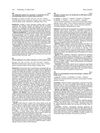
Ayurvedic herbs may reduce side effects and improve effectiveness of cancer treatments.
 June 2021 in “Research Square (Research Square)”
June 2021 in “Research Square (Research Square)” Adverse events in lung cancer treatments increase fear, anxiety, and depression, with newer therapies causing fewer side effects.
 13 citations,
May 2018 in “Urologic Oncology: Seminars and Original Investigations”
13 citations,
May 2018 in “Urologic Oncology: Seminars and Original Investigations” Finasteride does not prevent bladder cancer.
[object Object]  February 2024 in “BioMetals”
February 2024 in “BioMetals” Heavy metals like arsenic, cadmium, and lead can increase cancer risk and worsen outcomes.
 29 citations,
August 2007 in “Annals of Oncology”
29 citations,
August 2007 in “Annals of Oncology” Docetaxel and oxaliplatin are effective and have manageable side effects for recurrent platinum-sensitive ovarian cancer.
 August 2022 in “Deleted Journal”
August 2022 in “Deleted Journal” Nutritional education reduces chemotherapy side effects and improves health in breast cancer patients.
 19 citations,
May 2021 in “Clinical epidemiology and global health”
19 citations,
May 2021 in “Clinical epidemiology and global health” Better awareness of chemotherapy's side effects improves self-care.
[object Object]  148 citations,
April 2009 in “Molecular Pharmaceutics”
148 citations,
April 2009 in “Molecular Pharmaceutics” Researchers developed promising agents for prostate cancer imaging, with the best one showing high potential for clinical use.
 31 citations,
August 2022 in “Frontiers in Oncology”
31 citations,
August 2022 in “Frontiers in Oncology” Photobiomodulation therapy helps manage cancer treatment side effects but needs more research for optimization.
 20 citations,
January 2013 in “Cell & Bioscience”
20 citations,
January 2013 in “Cell & Bioscience” Understanding how epigenetic regulation affects stem cells is key to cancer insights and new treatments.
September 2016 in “Oncology times” Breast cancer survivors often face body image and sexual health issues, needing ongoing support and open communication with healthcare providers.
50 citations,
April 2010 in “Biology direct” Low androgen levels might delay prostate cancer but could lead to more aggressive, therapy-resistant cancers.
 March 2010 in “Ejc Supplements”
March 2010 in “Ejc Supplements” CK 5/6 expression in breast cancer is linked to negative hormone receptor status and higher tumor grade.
 32 citations,
February 2017 in “Oncotarget”
32 citations,
February 2017 in “Oncotarget” Cellular senescence has both cancer-blocking and cancer-promoting effects, and targeting senescent cells may improve health and lifespan.
56 citations,
July 2014 in “PloS one” SARMs may be an effective treatment for a certain type of breast cancer by blocking cancer growth and spread.
27 citations,
January 2018 in “Drug Delivery” GC10/DOX hydrogel shows promise as an effective thyroid cancer treatment.
 10 citations,
September 2021 in “JAMA Dermatology”
10 citations,
September 2021 in “JAMA Dermatology” Different types of persistent hair loss after chemotherapy respond differently to treatments.
 17 citations,
June 2017 in “British Journal of Dermatology”
17 citations,
June 2017 in “British Journal of Dermatology” The article concludes that hair loss is a common side effect of drugs treating skin cancer by blocking the hedgehog pathway, but treatment should continue, and more selective drugs might prevent this side effect.
 103 citations,
June 2018 in “International Journal of Molecular Sciences”
103 citations,
June 2018 in “International Journal of Molecular Sciences” FGF signaling is a promising target for developing treatments for wounds, metabolic diseases, and cancer.
 19 citations,
July 2020 in “Journal of cancer survivorship”
19 citations,
July 2020 in “Journal of cancer survivorship” People undergoing chemotherapy need better support and information to cope with hair loss.
 22 citations,
October 2018 in “British Journal of Haematology”
22 citations,
October 2018 in “British Journal of Haematology” Women have a higher risk of blood clots from hormonal factors and need careful treatment, especially during pregnancy.
 9 citations,
August 2019 in “Clinical genitourinary cancer”
9 citations,
August 2019 in “Clinical genitourinary cancer” Taking 5-Alpha Reductase Inhibitors before bladder removal surgery might make high-grade bladder tumors less aggressive.
 7 citations,
March 2011 in “Expert Opinion on Drug Safety”
7 citations,
March 2011 in “Expert Opinion on Drug Safety” Exemestane is effective and safe for treating certain breast cancers, with mild side effects, but needs more research on long-term effects.
 182 citations,
November 2017 in “Molecular Aspects of Medicine”
182 citations,
November 2017 in “Molecular Aspects of Medicine” The PDGF/PDGFR pathway is a potential drug target with mixed success in treating various diseases, including some cancers and fibrosis.
 73 citations,
September 2016 in “Journal of Translational Medicine”
73 citations,
September 2016 in “Journal of Translational Medicine” Some heart drugs show promise for other conditions, but more research is needed to confirm their effectiveness and safety.
 8 citations,
January 2003 in “Pharmacotherapy: The Journal of Human Pharmacology and Drug Therapy”
8 citations,
January 2003 in “Pharmacotherapy: The Journal of Human Pharmacology and Drug Therapy” Chemotherapy may cause recurring hair loss due to an autoimmune response.
 61 citations,
January 2017 in “Human Reproduction Open”
61 citations,
January 2017 in “Human Reproduction Open” The review recommends hormone replacement therapy for women with premature ovarian insufficiency to manage symptoms and protect health, with specific approaches for different groups.
 June 2007 in “Endocrinology and Metabolism Clinics of North America”
June 2007 in “Endocrinology and Metabolism Clinics of North America” The foreword introduces a medical issue discussing male hormonal health, treatments, and the effects of conditions like obesity and aging.
38 citations,
November 2020 in “International journal of biochemistry & cell biology” Keratin proteins are essential for keeping the cells in the human colon healthy and stable.
17 citations,
June 2020 in “Anais brasileiros de dermatologia/Anais Brasileiros de Dermatologia” Scalp cooling is an effective way to prevent hair loss from chemotherapy.
























